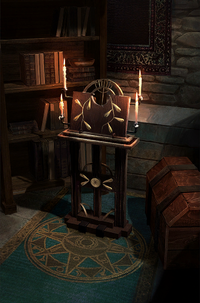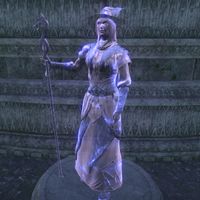Spellmaking,[1] also known as spell making,[2] spell-crafting,[3] or spellcrafting,[nb 1] is the magical craft of creating new spells.[2] Spells taught at institutions of learning, known as circinate spells are standardized and more readily available. However, for more advanced practitioners of magic seeking more unique effects, spellmaking is an option.[4][5]:64 Ulfsild the Evergreen collaborated with Luminaries of Magic to create Scribing in the First Era, the precursor to the modern spellcrafting system.[6][UOL 1] Scribing when it was rediscovered caught the attention of Vanus Galerion, who envisioned altars in every Mages Guild hall, and saw that Scribing would influence even roving mages out in the wilds.[7] Spellcrafters have existed outside Ulfsild's Scribing and Vanus Galerion's modernization, however, and have created spells outside their contributions.[8]
Those who practice spellmaking are referred to as spellmakers,[1] spellcrafters,[9] and spellsmiths.[nb 2] They are known as the Isolationists within the Mages Guild of the Iliac Bay.[10]
Spellmaking Altars,[11] and Spell Makers, serve as the supplementary tools for mages to craft spells.[4] Magetallow candles are utilized to power some of those tools.[11][12] However, some mages are capable of inventing spells without utilizing these altars, opting instead to cast them directly to assess their effects, sometimes on willing subjects.[13]
Spells were sometimes named after their creators, such as Merien's White Mask devised by Merien Sellan of Eagle's Brook,[14] or Shalidor's Mirror created by the legendary Arch-Mage Shalidor.[15][16] Master Neloth of House Telvanni also lent his name to his experimental spells.[13][17] Sometimes spells and magically enchanted scrolls are named after other individuals. Tarhiel's spell and scrolls of Icarian Flight bore Icarian's name.[nb 3]
While usually associated with magical institutions like the Mages Guild and similar organizations,[10] as well as temples such as the Temple of Kynareth,[18] spell invention is a practice observed among mages throughout Tamriel,[1] and beyond,[19] spanning from elite practitioners like Master Neloth, or Archmagister Mavon of House Telvanni,[13][8] to more commonplace spellcasters, whether from urban, rural, or tribal backgrounds.[1][14]
Imperial law mandates the Mages Guild to instruct any eager learner in the commonly practiced spells of magic, yet it does not extend the same obligation to the crafting of magical items or the acquisition of components essential for creating new spells, and Advanced Spellcrafting was considered potentially dangerous to the public at large. Accessing the guild's spellmaking and enchanting services necessitates higher-ranked membership in good standing by the Council of Mages, and entry to the Arcane University.[20][21]:64
Frostcrag Spire and the Praxographical Center of the Arcane University are known for their spellmaking equipment.[11][22] Master Spellmakers are the mages who resided in the Arcane University and offered their services to other members of the guild. In the late Third Era, in 3E 433, Borissean and Gaspar Stegine were considered the premier spellmakers of the university.[23]
GalleryEdit
NotesEdit
See AlsoEdit
ReferencesEdit
- ^ a b c d Spellmakers in Vvardenfell and Mournhold in Morrowind and Morrowind: Tribunal
- ^ a b Spell Making in Oblivion
- ^ Felen Relas' dialogue in Oblivion
- ^ a b Dialogue during Banish Daedra in Daggerfall
- ^ Daggerfall User's Guide
- ^ The Crow's dialogue in ESO
- ^ Loremaster's Archive - Scribing — Votary Nahila
- ^ a b c Archmagister Mavon's Ascension — Nardhil Arethan
- ^ Prior Maborel's dialogue in Oblivion
- ^ a b Isolationists in Daggerfall
- ^ a b c Frostcrag Spire Memoirs — Taris Rendil, Arch-Mage
- ^ Magetallow Candles Box in Oblivion
- ^ a b c Neloth's dialogue during Experimental Subject (A) and Experimental Subject (B) in Skyrim: Dragonborn
- ^ a b Tamien Sellan, and Merien Sellan's dialogue in ESO
- ^ Shalidor's Mirror effect in Morrowind
- ^ Arch-Mage Shalidor's dialogue in ESO
- ^ Neloth's Health Boost, and Neloth's Memory Spell Powers in Skyrim: Dragonborn
- ^ a b Spellsmiths of Kynareth in Daggerfall
- ^ Guide to New Sheoth — Brenith Aralyn
- ^ Manual of Spellcraft
- ^ The Elder Scrolls IV: Oblivion Official Game Guide — Peter Olafson
- ^ Praxographical Center in Oblivion
- ^ Gaspar Stegine, and Borissean's dialogue in Oblivion
- ^ Shatasha, and Valdam Andoren's dialogue in ESO
- ^ Spaulder of Ruin's antiquity codex entries in ESO: The Deadlands
- ^ Dremora Spellsmiths in ESO: The Deadlands
- ^ Icarian in ESO and From Nirn to the Aether — Icarian
- ^ Tarhiel Farano's dialogue in ESO: Necrom
- ^ Journal of Tarhiel — Tarhiel
- ^ Scroll of Icarian Flight and Icarian Flight spell in Morrowind
- ^ Events of A Falling Wizard in Morrowind
Note: The following references are considered to be unofficial sources. They are included to round off this article and may not be authoritative or conclusive.

